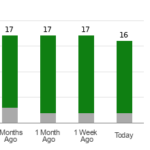High electric vehicle (EV) prices and concerns over charging infrastructure have subdued consumer interest in EVs. This shift has seen consumers pivot towards hybrids – a fusion of gasoline and electric propulsion, witnessing robust sales growth over the last five years. In 2023, Americans snapped up a record 1.2 million EVs, marking a 46% yearly surge, while hybrid sales soared by 65%. Including plug-ins, hybrids accounted for approximately 10% of all new car acquisitions in the U.S., surpassing all-electric vehicles with a 7.6% market share.
With the Biden administration tweaking auto emissions standards to combat carbon emissions from passenger vehicles, manufacturers of plug-in hybrids and gas-electric hybrids are poised to reap benefits.
The Hybrid EV Market Landscape
Predictions point towards robust growth in the U.S. hybrid EV market at a 13.8% Compound Annual Growth Rate (CAGR) until 2032. This sets the stage for a showdown between two automotive industry behemoths – Ford Motor Company (F) and Toyota Motor Corporation (TM) – both vying aggressively for a larger share of the expanding hybrid EV market.
The Ford Motor Story
Established in 1903, Michigan-based Ford Motor Company (F) crafts and sells a portfolio of trucks, commercial vehicles, SUVs, and luxury Lincoln automobiles globally. The company boasts a current market cap of $51.89 billion.
Ford’s shares have advanced by 14.5% in the last 52 weeks, trailing behind the S&P 500 Index’s 30.5% surge. However, the stock has been a chronic underperformer over the past decade, witnessing a decline of nearly 15%.
The company halted dividend payments in 2020 due to the pandemic but reintroduced a quarterly dividend of 10 cents per share in October 2021. This dividend has seen a gradual uptick, currently standing at a regular quarterly rate of 15 cents per share as of the Q4 2023 earnings call, accompanied by the issuance of a special dividend of 18 cents per share.
Ford’s yearly dividend of $0.60 per share offers a yield of 4.6%. With a payout ratio of 61.4%, the company demonstrates robust dividend coverage based on adjusted earnings.

Trading at 6.85 times forward adjusted earnings and 0.29 times sales, Ford’s current valuation reflects a notable discount compared to both its industry counterparts and its own five-year averages.
Ford Surpasses Q4 Earnings Estimates
In the previous year, Ford offloaded 72,608 EVs, encountering an EBIT loss of $4.7 billion in its “Model e” category, translating to a staggering loss of $64,731 per EV sold in 2023. However, total Ford hybrid sales surged at the end of the year, recording a 55% upswing with Q4 sales hitting 37,229 vehicles.
During the early February earnings announcement for Q4, Ford reported a collective loss of $526 million, mainly attributed to special charges tied to employee pension schemes and the restructuring of overseas operations. Higher labor expenses due to an extended UAW strike also ate into the company’s fourth-quarter profits as acknowledged by Ford’s CFO, John Lawler.
Despite these setbacks, Ford’s adjusted Q4 earnings of $0.29 exceeded consensus projections, while the revenue of $43.21 billion outperformed Wall Street’s forecasts.
The Road Ahead: Evaluating Toyota’s Dominance in the Hybrid Market
Ford’s Hybrid Sales Surge Under Farley’s Leadership
In a recent conference call accompanying the Q4 release, CEO Jim Farley expressed optimism regarding Ford’s global hybrid sales, noting a 20% increase last year and an expected 40% surge this year.
Analyst Sentiment and Price Targets for Ford Stock
Despite a shift from a “Moderate Buy” to a “Hold” consensus among analysts, Ford maintains a mixed bag of recommendations with five “Strong Buy,” two “Moderate Buy,” eight “Hold,” and three “Strong Sell” ratings. The average analyst price target of $13.70 suggests a potential 3.2% upside, while the Street-high target of $21 by Bank of America forecasts a significant 58.18% rally.
The Case for Toyota Stock
With a market cap of $341.6 billion, Toyota Motor Corporation stands as a global leader in the automotive industry, renowned for its passenger vehicles, hybrids, and commercial cars. Valued for its consistent returns, Toyota shares have outperformed the market significantly, offering investors stability and growth opportunities for over a decade.
Toyota’s Growth Fueled by Hybrid Dominance
Toyota’s strategic focus on hybrid technology has accelerated its growth trajectory, with Q3 sales soaring by 23% year-over-year while net income spiked by 86.5%. Embracing a hybrid-centric future, Toyota foresees a surge in hybrid sales, leveraging its expertise to cater to evolving consumer demands for sustainable driving options. This approach has won favor among analysts, with a consensus “Moderate Buy” recommendation and a modest upside potential of 3.5%.
Deciphering F vs. TM: Which Stock Holds the Winning Keys?
Comparing Ford and Toyota, both prominent automakers with a stake in the hybrid market, reveals intriguing dynamics. While Ford shines in the EV space, Toyota’s legacy of innovation and robust financial standing position it as a frontrunner in hybrid EVs. Coupled with its reliable dividend track record, Toyota emerges as a stronger buy, embodying a blend of tradition and forward-looking strategies in this ever-evolving automotive landscape.





